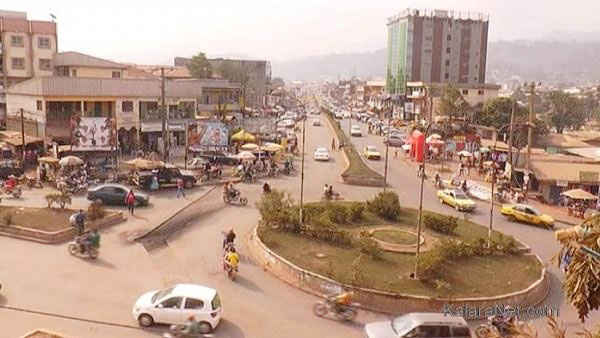A prefectorial order from Mezam SDO and a counter one from Separatist fighter, respectively banning motor bikes and cars from circulating between 6pm and 6am, has brought in more suffering to locals who work and carryout activities within that time.
On December 1, 2023, the Senior Divisional officer for Mezam Division in Cameroon’s Northwest region, Simon Emile Mooh issued a prefectorial order, “banning the circulation of motor bikes within Bamenda town in Mezam Division,”
In the said prefectorial order No576PO/E.29/ALPAS, Emile Mooh said in ARTICLE 1, that “with effect from the date of signature of this Order, the circulation of Motor Bikes within Bamenda Town shall henceforth be prohibited as follows from 6 pm to 6 am”
In Bamenda I Sub-Division, he banned circulation from;- New road - GRA- Hotspot - Governor's Junction; -Custom Junction - Avenir Park; Custom Junction - Mile1-Blue Moon.
In Bamenda II Sub-Division, he restricted movement of bikes from -Old Council -Hospital Roundabout; -Azire New Church Junction - Hospital Roundabout; -Azire Old Church Junction - Hospital Roundabout; - Veterinary Junction - Ayaba Hotel -T-Junction; – Hospital Roundabout-Commercial Avenue; -Rendez-Vous - City Chemist Roundabout- Sonac Street
In Bamenda III Sub-Division, the SDO banned circulation from -Foncha Street Junction Amour Mezam -Total Nkwen; -Total Nkwen -Cow Street- Ngeng Junction; - Mile 6-New road - Amour Mezam - New road – Ntenefor.
ARTICLE 2 of the order stated that any person or group of persons who violate the provisions of the present order shall be punished in accordance with the rules and regulations in force.
ARTICLE 3 charged the Divisional Officers of Bamenda I, Il & Il Sub-Divisions, the City Mayor BCC, The Mayors of Bamenda l, Il & lI, and the Forces of Law and Order to strictly implement the order.
The SDO’s order in effect, banned several persons from moving in the said area, because thousands of people rely on bikes to go to work and to return home. Several business operators who operate their businesses into the late hours of the night often rely on bikes to be transported home. Those who are working evening or night shifts often rely on bikes too, to get to work and back. This is especially so, as the bad nature of roads has made bikes the best-preferred means of transport for many in Bamenda like other towns. As such, the ban has made life miserable for many who either own bikes use them.
Separatist Fighters Counter With Ban On Cars
Following the SDO’s order to ban bikes, separatist fighters operating in Mezam immediately came up with their own retaliatory order, banning vehicles from circulating in all areas where bikes have been prohibited from operating in.
In a voice note sent out and posted in their social media handles, a leader of the fighters in Mezam said several young people in Bamenda make a living from commercial bike riding, and as such, they won’t tolerate the SDO’s ban. “In all places where the SDO says bikes won't move, as from this evening, (December 2), no car will ply those axis too. If bikes are not allowed to use any road as from 6pm-6am, no car is allowed to use the same road within that time too. Bikes and cars will use all roads at the same time”, he said.
The separatist leader went on to say that they are also aware of the harassment and robbery going on in some of the cited areas, and are calling on locals to assist them identify and apprehend any person or persons claiming to be separatist fighters and harassing locals.
The two bans from the SDO and separatists have both made life miserable for locals who are the most affected by the two bans. They are caught in the middle and face a possibility of either being shot and killed by soldiers or separatists, or in some cases, arrested or abducted for going against the orders of the two.
A taxi driver in Bamenda, (name withheld) for security reasons, criticised the bans, saying that it is making life very difficult and uncertain for them. He had picked up this reporter, after he was abruptly dropped from a bike he had hired from Ayaba hotel to Foncha Street, but on the way, met a security post and he abruptly stopped, saying he could not continue because he risked losing his bike and being arrested.
Later, this reporter after trekking for a while, got a taxi. The taxi driver too complained that the ban from separatists too meant that their safety too was not guaranteed. As such, he had to charge an extra fee, before taking the risk to drive into a neighbourhood where he said separatist fighters too could strike.
Though the SDO has not stated the reason behind his move in the communique, many suspected it is because separatist fighters mainly use bikes as a means of transportation, and as such, the SDO wants to totally ban bikes because separatists too use them.
The two bans violate Article 13 (1) of the Universal Declaration of Human Rights, which states that “Everyone has the right to freedom of movement and residence within the borders of each State”. The right has been taken from those in Bamenda who have been restrained from moving around, by the Mezam SDO and Separatists.
Article 23 (1) of the Declration also says that “Everyone has the right to work, to free choice of employment, to just and favourable conditions of work and to protection against unemployment. The two bans effectively prevent many from being able to work freely, and doing any work of their choice, because those working at the prohibited hours risk being targeted and harmed for going against either the SDO or separatists.
By Andrew Nsoseka, JADE

